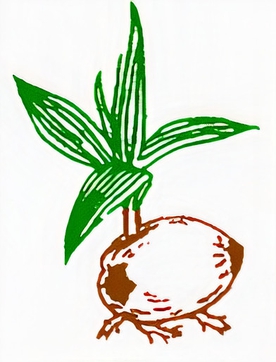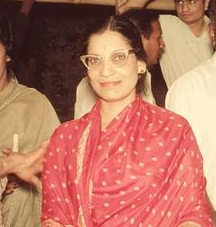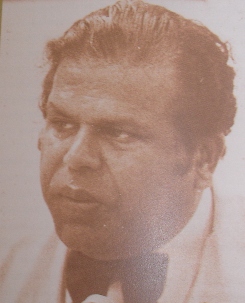
The Fiji Labour Party, also known as Fiji Labour, is a political party in Fiji. Most of its support is from the Indo-Fijian community, although it is officially multiracial and its first leader was an indigenous Fijian, Dr. Timoci Bavadra. The party has been elected to power twice, with Timoci Bavadra and Mahendra Chaudhry becoming prime minister in 1987 and 1999 respectively. On both occasions, the resulting government was rapidly overthrown by a coup.

Irene Jai Narayan was an Indian-born teacher and politician, who had a significant influence on politics in Fiji. She came to Fiji in 1959 after marrying Jai Narayan, a well known school Principal in Suva, and began her career as a teacher. She taught in DAV Girls School and MGM High School in Suva before entering politics.

Siddiq Muhy'Ddin Kwaja, officially known as Siddiq Moidin Khoya was a Fijian politician, Statesman and Opposition leader. He succeeded to the leadership of the mostly Indo-Fijian National Federation Party (NFP) on the death of the party's founder, A. D. Patel, in October 1969, remaining in this post until 1977. He later served a second term as leader of the NFP, from 1984 to 1987.

Jai Ram Reddy, CF was an Indo-Fijian politician, who had a distinguished career in both the legislative and judicial branches of the Fijian government. In 1998, he received Fiji's highest honour, the Companion of the Order of Fiji, in recognition of his services to his country.

General elections were held in Fiji between 19 March and 2 April 1977. As a result of a split in the ethnic Fijian vote, the ruling Alliance Party of Prime Minister Kamisese Mara suffered a narrow defeat. Although the Alliance Party received the most votes, it won only 24 seats, two fewer than the Indo-Fijian-dominated National Federation Party (NFP). One seat was won by the Fijian Nationalist Party, with the remaining seat going to an independent candidate, Osea Gavidi.

Early general elections were held in Fiji between 17 and 24 September 1977. They followed elections in March which resulted in a hung parliament and no party able to gain a majority. The new election resulted in a landslide win for the Alliance Party (Fiji) led by Prime Minister Kamisese Mara, which won 36 seats out of 52. It was aided by a split in the main opposition, the National Federation Party (NFP) and a decline in support for the Fijian Nationalist Party.

The National Federation Party is a Fijian political party founded by A. D. Patel in November 1968, as a merger of the Federation Party and the National Democratic Party. Though it claims to represent all Fiji Islanders, it is supported, in practice, almost exclusively by Indo-Fijians whose ancestors had come to Fiji between 1879 and 1916, mostly as indentured labourers. However, in the 2018 general election, the party recorded a considerable change in its support base due to the inclusion of more indigenous Fijian candidates.

Fiji's parliamentary election of March 1977 precipitated a constitutional crisis, which was the first major challenge to the country's democratic institutions since independence in 1970.

Ambalal Dahyabhai Patel, better known as A.D. Patel, was an Indo-Fijian politician, farmers' leader and founder and leader of the National Federation Party. Patel was uncompromisingly committed to a vision of an independent Fiji, with full racial integration. He was one of the first to advocate a republic, an ideal not realized in his lifetime. He also advocated a common voters' roll and opposed the communal franchise that characterized Fijian politics.

Western United Front (WUF) was an ethnically Fijian political party formed prior to the 1982 elections and contested the election in coalition with the National Federation Party . The party was in response to the disenfranchisement of indigenous peoples in the Western Provinces of Viti Levu as despite the presence of major economic drivers of the country located in their areas they lack representation on the decision making table of the country.
Raojibhai Dahyabhai Patel was an Indo-Fijian lawyer and politician, who was better known as the younger brother of A. D. Patel. To distinguish between the two, he was generally referred to as R.D. A member of parliament from 1966 until 1976, he was Speaker of the House of Representatives between 1972 and 1976.
The Federation Party was Fiji's first formal political party. The Citizens Federation, which had won three of the four seats reserved for Indo-Fijians at the 1963 elections, decided to formalize its role as a political party, which was officially founded on 21 June 1964 with A. D. Patel as President and Sidiq Koya as Vice-President. The merger took place in time for the party to participate in the 1965 constitutional conference which was called to map out a path towards independence from the United Kingdom. In 1968, the Federation Party merged with the National Democratic Party to form the National Federation Party, which is now (2021) the oldest political party in Fiji still in existence.
Davendra Singh was a Fiji Indian small businessman and politician who came into prominence when he challenged and defeated the official National Federation Party (NFP) candidate in a by-election in March 1985.

Karam Chand Ramrakha was a former Fiji Indian lawyer, union leader and politician, who served in colonial Fiji's Legislative Council and independent Fiji's House of Representatives from 1966 to 1982.
The Dove Faction was one of the factions of the National Federation Party (NFP) to contest the September 1977 elections in Fiji.
The number of Fiji Indians that could be elected to the Legislative Council was fixed over the years as follows:
Harilal Manilal Patel is a Fiji Indian lawyer who has also been a member of the House of Representatives of Fiji.
Balwant Singh Rakkha was a Fiji Indian medical doctor and a member of the House of Representatives of Fiji representing the National Federation Party (NFP), but he is best known for his strong support for the former leader of the NFP, Sidiq Koya and the split caused within the NFP when he was rewarded by Koya for his loyalty by being given a seat in a constituency where he was a virtual unknown.
Ratu Julian Nasaroa Brown Toganivalu was a Fijian chief, civil servant and politician. He was a member of the House of Representatives for three days in 1977.







